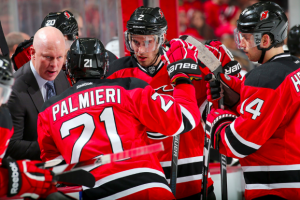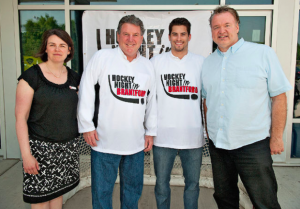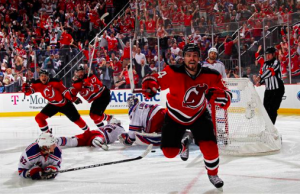Adam Henrique debuted as the alternate captain for the New Jersey Devils in the NHL in 2011. A Canadian, Henrique grew up in Brantford, Ont., playing for minor-league hockey team the Burnford Coyotes. He was selected by the Devils in the third round, 82nd overall, of the 2008 NHL Entry Draft. On Oct. 29, 2016, Henrique scored his 100th career goal in a home game against the Tampa Bay Lightning.

Q: As a player for the New Jersey Devils, how has your experience been with their coach, John Hynes?
A: Hynes has really come in and created a culture for our team, we’ve kind of had a big changeover in not only managment and coaching, but players as well you know it’s kind of been a tough transition, but he’s really come in and preached creating a culture and come in for the players.
Everybody’s on the same page now and it’s been showing, we’re really off to a great start. He’s a really good motivator. He’s always trying to push us to be our best and that’s something that has certainly grown over the past couple of years.
What do you think are some important qualities hockey coaches should have?
I think now you just have to be able to be on the same page as your players, being able to see the game, to teach the game. Being able to read different situations for your team specifically, because every time is different and every player is different, and you need to get to know know people, you’re able to get a good grasp of what your team is made up of. I think John has a really good grasp on that.

How has hockey culture changed in Canada?
Everything that we do now, there’s some sort of scientific reason behind it, and it’s really changed the game of hockey from what I used to play. Back in the old days of hockey, there was no off-season training. Now it’s really become like a 24/7 job.
The fans are always looking to watch the game and find ways to get more stats, and now they’re trying to introduce more technology into the game for us even in a sense of wearing technology to track everything and all our movement.
Televising hockey every Saturday night has definitely played a part in that as well.
Yes, absolutely. Growing up, for me, [my family] would sit at home and watch Hockey Night in Canada every night in Toronto. Now the analysts are trying to track more to give the fans watching more to try and get more people to watch more to grow the game. Not just in Canada, but around the world, that’s just something we’ve been trying to do to grab a larger viewing audience.

What role do you think violence plays in the NHL, and have attitudes toward it changed at all?
Well I wouldn’t say violence. I guess when you think violence, you thinking fighting, and that’s sort of something that has changed a lot over the past 10-15 years where it used to be a bigger part of the game.
Now, with the amount of risks and concussions and brain testing that’s going on across the sports world — you know, not just in hockey, you see it in football too, the game is changed to more smaller, faster-type game, where you don’t see fighting as much. I think the good part of that is that, in the younger levels of hockey, they’ve really tried to push it out of the game, and you just don’t see it as much anymore.
Do you think socioeconomic backgrounds play a part in who can play hockey?
Well, I guess yes, in a sense. It’s expensive to play. There’s a lot that goes into it, to be able to get kids to the rink to play, which is unfortunate because I’m sure there are a lot of kids that want to play, but aren’t able to.
Certainly with that too you see a lot of players trying to do charitable things. A big one for guys is trying to get younger kids involved and get out in the community and do what they can, whether it’s donating equipment or putting up hockey schools to get kids from all over to be able to play. That’s one of the things that that we do get to do. You know, you just want to give back to the community where you came from, where you got your start. It’s very rewarding to see.

In your opinion, what do you think it took for you to get where you are today?
You know, it basically started off with my parents, raising me the way they did and taking me to tournaments when I was younger and then supporting me through the OHL and my career — the ups and the downs. I was fortunate enough to have a lot of great coaches throughout my career, especially in junior hockey in Windsor, with coaches who had played in the NHL. They showed us what it took to get to the next level, and how to play at that level. That was a big reason why a lot of guys on those two teams made it to the NHL and have had big careers so far.
What are some of your personal favourite moments of your NHL career?
My first game, I think for any player, that’s one of your greatest moments. It’s kind of your ‘I made it’ moment. I remember stepping on the ice and it was a full crowd and I couldn’t believe it.
My first year I scored a couple of big overtime goals in the playoffs. One was in game seven against Florida, in the first round of the playoffs. Then the other one was against the New York Rangers in the eastern conference finals in game six which would send our team to the Stanley Cup finals. Those are some of the bigger ones that stand out.
Header image Andy Marlin/NHLI via Getty Images

Leave a Reply